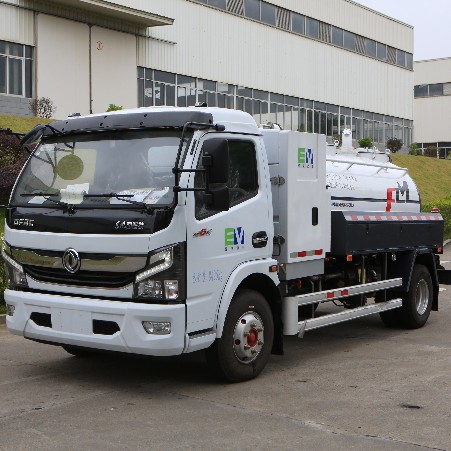Imagine a city bustling with activity, its streets filled with people, cars, and the daily commotion of urban life. Beneath the surface of this lively environment lies a crucial system working tirelessly to keep everything running smoothly—septic systems. They manage waste from homes and businesses, ensuring our surroundings stay hygienic and pleasant. But behind the scenes, there’s an unsung hero of this waste management system: the septic vacuum truck.
A septic vacuum truck is a specialized vehicle designed for the effective removal and transportation of waste from septic systems. These trucks are essential for maintaining both residential and commercial septic systems, ensuring that waste is safely and efficiently extracted and disposed of.

Technology Behind Septic Vacuum Trucks
1. Vacuum System Technology
Modern septic vacuum trucks utilize advanced vacuum technology to achieve high levels of efficiency. The vacuum pump creates a powerful suction force that extracts waste from septic tanks, while high-capacity fans ensure that the vacuum system operates smoothly. Innovations in vacuum technology have led to more efficient and reliable systems that reduce downtime and improve overall performance.
2. Tank Design
The design of the storage tank has evolved to accommodate larger volumes of waste while ensuring durability and ease of maintenance. Features such as corrosion-resistant coatings and reinforced materials help extend the lifespan of the tank and improve its functionality.
3. Pumping Mechanism
Advancements in pumping technology have led to more efficient and reliable pumps that can handle a wide range of waste materials. Modern pumps are designed to minimize clogging and maintain consistent performance, reducing the need for frequent repairs and maintenance.
4. Filtration Systems
To ensure that the vacuum truck operates cleanly and efficiently, advanced filtration systems are employed. These systems capture fine dust and particles, preventing them from being expelled into the environment and maintaining the performance of the vacuum system.
5. Smart Technology
Recent innovations have introduced smart technology into septic vacuum trucks, including GPS tracking, real-time data monitoring, and automated controls. These features enhance operational efficiency, optimize routes, and provide valuable insights into truck performance.

Efficiency and Performance
1. Operational Efficiency
The efficiency of a septic vacuum truck is influenced by its design and technology. Factors such as the power of the vacuum system, the capacity of the tank, and the effectiveness of the pumping mechanism all contribute to the truck’s overall performance. Advances in technology have led to more efficient trucks that can handle larger volumes of waste with greater ease.
2. Fuel and Energy Use
Fuel consumption and energy efficiency are critical considerations for septic vacuum trucks. Modern trucks are designed to be more fuel-efficient, reducing operational costs and minimizing environmental impact. Innovations such as hybrid and electric models are emerging, offering even greater fuel efficiency and lower emissions.
3. Maintenance and Longevity
Proper maintenance is essential for ensuring the longevity and reliability of septic vacuum trucks. Regular servicing, including checks on the vacuum system, tank, and pumping mechanism, helps prevent issues and ensures that the truck operates at peak performance. Advances in technology have also improved the durability and ease of maintenance for these vehicles.

Applications and Use Cases
1. Residential vs. Commercial Use
Septic vacuum trucks are used for both residential and commercial applications. In residential settings, they handle routine septic tank maintenance and emergency pump-outs. For commercial use, they manage waste from larger systems, such as those in restaurants or industrial facilities. The versatility of septic vacuum trucks makes them indispensable for various waste management needs.
2. Specialized Applications
In addition to standard waste management, septic vacuum trucks are also employed for specialized tasks, such as handling hazardous waste or cleaning large-scale septic systems. These specialized applications require advanced technology and robust design features to ensure safety and efficiency.
Conclusion
Septic vacuum trucks are more than just vehicles, they are complex systems that play a vital role in maintaining our septic infrastructure. From their advanced technology to their efficiency in waste management, these trucks are crucial for keeping our urban environments clean and functional. As technology continues to advance, septic vacuum trucks will become even more efficient, offering improved performance and reduced environmental impact.
By understanding the intricate workings of septic vacuum trucks, we gain a greater appreciation for their role in waste management and their contribution to a healthier, cleaner world.
FAQs
What maintenance is required for septic vacuum trucks?
Regular maintenance for septic vacuum trucks includes checking and servicing the vacuum system, inspecting the tank for leaks or damage, cleaning filters, and ensuring the pumping mechanism operates correctly. Routine maintenance helps prevent breakdowns and extends the lifespan of the truck.
How often should septic vacuum trucks be serviced?
Septic vacuum trucks should be serviced regularly, typically every 3,000 to 5,000 miles, or as recommended by the manufacturer. Additionally, inspections should be performed after heavy use or if the truck exhibits any issues.
What are the latest technological advancements in septic vacuum trucks?
Recent advancements include the integration of smart technology for real-time data monitoring, GPS tracking for route optimization, and innovations in vacuum and filtration systems for improved efficiency and reduced environmental impact. Electric and hybrid models are also emerging, offering greener alternatives.
How do septic vacuum trucks handle hazardous waste?
Septic vacuum trucks designed for hazardous waste are equipped with specialized tanks and filtration systems to safely contain and process dangerous materials. These trucks adhere to strict safety regulations to prevent contamination and ensure proper disposal.
What factors influence the efficiency of a septic vacuum truck?
Factors influencing efficiency include the power and design of the vacuum system, the capacity and material of the storage tank, the effectiveness of the pumping mechanism, and the truck’s overall design. Technological advancements also play a role in enhancing efficiency and performance.






